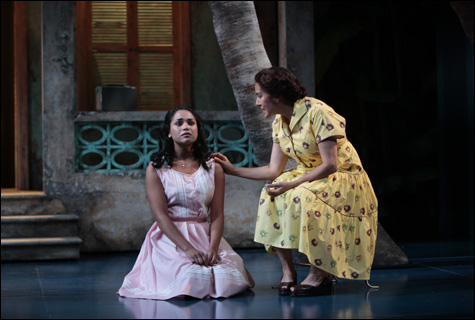
BOLEROS FOR THE DISENCHANTMENT: Jaime Tirelli and Socorro Santiago try to keep the enchantment going. |
In Boleros for the Disenchanted, Puerto Rican–born José Rivera looks beyond the fairy dust and sexual spark to probe the full meaning of “till death do us part.” But at the same time that this moving if hardly magical work, which is based on the playwright’s parents’ marriage, is about connection, it is also about disconnection — about a married life lived severed from all roots but each other. In other words, Boleros is as much an emigrants’ as a couple’s story, and it’s seen here in a production by the Huntington Theatre Company (at the Calderwood Pavilion through November 15) that follows the script’s premiere last May at Yale.
At first glance, Rivera’s look at the beginning and the end of romance seems more naturalistic than the magical-realist works that have made his name. Well, at last glance, too, there being no guerrilla angels or anthropomorphized moons in sight. Set in Puerto Rico in 1953, act one tells how pious if tempestuous Flora loses a philandering fiancé and gains a better young husband in Eusebio. Act two takes place 39 years later in Alabama, where Flora and Eusebio, now in their 60s, deal with disease, a destructive deathbed confession, and the disenchantment of the title. Still, if Boleros does not spin a metaphysical or apocalyptic fantasy in the manner of Cloud Tectonics or Marisol, neither is it entirely realistic: act one unfolds in a glimmering haze of nostalgia through which the tried and toughened couple of act two cling to a dream of “the enchanted island,” whose enchantments, alas, did not include gender equality or employment.
Chay Yew’s production for the Huntington makes the visual most of the play’s 39-year leap. As young Flora transfers identity to her older self along with a favored sweater, young Eusebio puts his shoulder to rotating Alexander Dodge’s floating set, trading a colorful Caribbean abode backed by a tangle of banana trees for the cramped tract house in which a bedridden Eusebio and a drudgingly ministering Flora are winding down their union. This does not change the fact that, except through exposition, we miss the meaty middle of their story — in which Eusebio neither realizes the American dream nor shakes the frisky, desperate machismo of his original, materially emasculating culture, and the sensual if saintly Flora is denied the one thing she frankly demanded in act one: sexual fidelity. But the point is not so much what the couple didn’t get as what they did: a lifetime of each other, warts and all. And that is tenderly conveyed, if with more grit than sentiment.
The same actors appear in each half, with Socorro Santiago and Jaime Tirelli, Flora’s volatile and protective parents of act one, becoming the mutually imprisoned, still devoted Flora and Eusebio of act two, she still clinging to Church and duty, he to no-longer-executable foibles and her. Santiago’s worn Flora is as earthy as she is devout, Tirelli’s Eusebio feisty if broken down. Monica Raymund, the radiantly haughty Flora of act one, has a sweet, brusque turn as a visiting nurse. Elliot Villar and Maria-Christina Oliveras, the Eusebio and Flora’s foxier cousin of act one, return as a lustily smitten couple whom Flora has been assigned by her church to acquaint with the sometimes-devastating truths of seasoned marriage. And Juan Javier Cardenas gets to atone as two priests for his early turn as the sanctimoniously womanizing boyfriend young Flora rejects. Almost another character is “Dolores,” the sad love song of the title ilk that sparks Flora and Eusebio’s romance and follows them north, dripping its plaintive emotion and exuding its whiff of home. It does not come through insistently enough here.